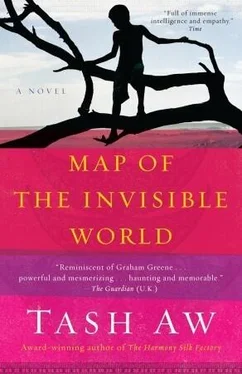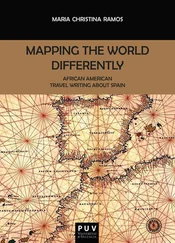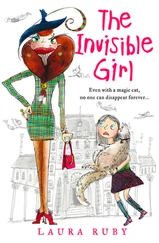Tash Aw - Map of the Invisible World
Здесь есть возможность читать онлайн «Tash Aw - Map of the Invisible World» — ознакомительный отрывок электронной книги совершенно бесплатно, а после прочтения отрывка купить полную версию. В некоторых случаях можно слушать аудио, скачать через торрент в формате fb2 и присутствует краткое содержание. Год выпуска: 2010, Издательство: Spiegel & Grau, Жанр: Современная проза, на английском языке. Описание произведения, (предисловие) а так же отзывы посетителей доступны на портале библиотеки ЛибКат.
- Название:Map of the Invisible World
- Автор:
- Издательство:Spiegel & Grau
- Жанр:
- Год:2010
- ISBN:нет данных
- Рейтинг книги:4 / 5. Голосов: 1
-
Избранное:Добавить в избранное
- Отзывы:
-
Ваша оценка:
- 80
- 1
- 2
- 3
- 4
- 5
Map of the Invisible World: краткое содержание, описание и аннотация
Предлагаем к чтению аннотацию, описание, краткое содержание или предисловие (зависит от того, что написал сам автор книги «Map of the Invisible World»). Если вы не нашли необходимую информацию о книге — напишите в комментариях, мы постараемся отыскать её.
comes an enthralling novel that evokes an exotic yet turbulent place and time—1960s Indonesia during President Sukarno’s drive to purge the country of its colonial past. A page-turning story,
follows the journeys of two brothers and an American woman who are indelibly marked by the past — and swept up in the tides of history.
Map of the Invisible World — читать онлайн ознакомительный отрывок
Ниже представлен текст книги, разбитый по страницам. Система сохранения места последней прочитанной страницы, позволяет с удобством читать онлайн бесплатно книгу «Map of the Invisible World», без необходимости каждый раз заново искать на чём Вы остановились. Поставьте закладку, и сможете в любой момент перейти на страницу, на которой закончили чтение.
Интервал:
Закладка:
“Oh well,” he said at last. “It’s only an empty bottle.” And he threw it hard past Adam against a stack of timber at the back of the shed. It hit the wood with a dull thud and did not shatter but merely broke un-dramatically into three or four neat pieces that fell onto the dirt floor.
“Come on,” Din said. “We have to get going.”
THE ROADS WERE blocked off as they approached Monas, and their becak came to a complete halt in the tangle of traffic. They got out and proceeded on foot, skirting the edge of the square. Bicycles brushed past them as they walked on the grass-and-dirt shoulder of the great avenue, and sometimes, as they went past a stationary van, Adam would have to wait and let Din pass in front of him or else risk slipping into the ditch.
“Actually, it’s better on foot,” Din said cheerily. “You see lots of famous landmarks close up.” He was still whistling the silly tune, never progressing beyond the same few notes of the chorus. Adam wished Din would stop, for it made him think of that place by the sea that was no longer his home.
At a crossroads they came upon barricades that held the traffic at a standstill. The perpendicular avenue was empty, a ghost town in the middle of the metropolis. Adam and Din stopped amid a throng of pedestrians at the barriers, straining to see the convoy streaming toward them: five or six magnificent black cars, some bearing a fluttering flag on their hood. Adam did not know that such cars existed in Indonesia; or, indeed, that they existed at all. They swept past the crowd in an instant, and a few moments later, when they were nearly out of sight, the soldiers removed the barricades, and the cars and scooters and bicycles recommenced their labored journey. As they went past the soldiers, Din put his arm around Adam’s shoulders. “One day, you might be an important person — like those guys in the cars,” he said. He drew Adam close to him, as an older brother might a younger brother, and Adam felt the satchel between them, bulky and hard and uncomfortable.
No trees lined the road. Adam could see no vegetation or foliage, just a forest of concrete structures built in fantastic shapes conceived in a dream. He was tired from the walking, he was tired of this city. It was not at all like the city he had once constructed in his imagination. He could barely remember that invisible world he had once known so intimately, a place full of love and possibility and promise. Walking along this interminable road, his ribs were beginning to hurt again, and the emptiness in his stomach reminded him once again that he was just like the millions of other people around him.
“It feels strange, knowing that I’m going to look for my brother after all these years. I never thought I could talk about it, or even think about it,” said Adam. Contemplating this new future seemed the only way to alleviate the pain in his ribs and the sharp bite of blisters that were beginning to form on his heel and big toe. “In a way, I’m glad I can’t remember anything about him. That way I won’t be disappointed.”
“Of course you won’t be disappointed. You’ll find your brother because that’s your only choice in life — and I’ll be there to help you, don’t you worry.” Din spoke with the same generosity as earlier, but he sounded brisker now, more distracted, as if he did not really wish to converse. Maybe he too was tired.
At last they approached a roundabout built around a perfectly circular pool of water; it was so wide that Adam could not make out the faces of the pedestrians on the far side. In the middle of the pool there was a fountain and a statue of a boy and girl holding hands on top of a giant plinth. In the streets there were clusters of soldiers everywhere, on foot and in trucks, chatting calmly among themselves, or smoking cigarettes. Adam and Din walked past a group of half a dozen of them manning a barbed-wire barricade in front of a badly burned building. One of them threw his head back in laughter as his colleague told a joke (Adam heard something about “a buffalo” and “wife” as he walked past) and in his black sunglasses Adam saw the reflection of ocher-colored clouds. These soldiers were older and more strongly built than the ones who had taken Karl away, thought Adam. They looked calm, even relaxed, but there was a tenseness in the way they held their guns, slung tautly from their necks, the butts cradled in their biceps.
“Are you admiring the Victory Monument?” Din asked, pointing at the statue of the blissfully innocent children above the fountain; frozen in full stride, they looked as if they were about to step off their platform and fall into the shallow water below. As they passed another group of soldiers, Din put his arm around Adam’s shoulders once again. “Bet you don’t have great monuments like this where you come from, out in the islands,” he continued loudly. “Come on, you’re impressed, aren’t you? Don’t try and act cool. This is a symbol of modern Indonesia!” He was still smiling, but as he continued Adam noticed the change in his voice, as if he were trying to conceal or suppress something. It took Adam a while to work out what this thing was: fear. He recognized it because it was something he had grown to know intimately over the last few days. He recognized it because, quite suddenly, he too felt a quick, inexplicable shiver of fear rush through him.
“But in fact we have just passed the truest face of revolutionary Indonesia,” Din said as they made their way to the far side of the roundabout. “The burning of the British Embassy — that is what the revolution is really about.”
“Look,” Adam said as they approached a majestic, modern building, “there are the cars we saw earlier.” A row of gleaming black cars stood waiting on the ramp leading to the building — many more than just the five or six they had seen before. “What is this place? It’s amazing. Is it the president’s palace?” he asked.
Din laughed — a cold, hard, sneering laugh. “That’s the symbol of all that is wrong with our world today. It is the palace of corruption and hedonism and injustice and every other evil you can think of — so, yes, I suppose you could say it’s the president’s palace. That’s very clever of you, my little orphan. You see, I was right all along: You are a revolutionary at heart.”
They seemed to be walking past it, away from the great roundabout, into the dusty side streets where the buildings were lower and more modest. Adam looked back at the palace, admiring its perfect angular construction. He knew, of course, that it was not a real palace, but it comforted him to think of it as such. He liked the way it looked solid, permanent, and comfortable, unlike the tin-and-timber shacks where he had passed the last few nights. He also knew that it was a place where he would not be welcome. Not so long ago, with Karl to look after him, he might have felt perfectly at ease in a place like that. But that was his Past Life. In this, his Present Life, he belonged to the other side, the side of the nameless and hungry who walked the dusty streets looking up at the great buildings and shiny cars of this great city, trying to imagine what kind of people might inhabit that world.
They stopped in the shade of a concrete shelter surrounded by giant, rusty bins, emptied of their contents; the sweet stench of rubbish lingered in the air. Din reached into his satchel and took out a packet of 555s. “I didn’t know you smoked,” Adam said.
“I don’t,” Din replied, striking a match and lifting it hesitantly to the cigarette he had placed between his lips. His hand was trembling, Adam noticed, the flame refusing to settle on the stubby point of the cigarette. When he spoke, Adam could barely make out his narrowed eyes through the cloud of smoke. “Now this is the moment I need you to help me. Inside this palace of sin there are many people, many important people, many foreigners. These foreigners are intent on wrecking the great Indonesian revolution by paying corrupt officials to sacrifice the future of the Indonesian people — good, ordinary folk like you and me. A party is about to begin, a celebration of all the things that are wrong with our country. In an hour, even the president will be there.”
Читать дальшеИнтервал:
Закладка:
Похожие книги на «Map of the Invisible World»
Представляем Вашему вниманию похожие книги на «Map of the Invisible World» списком для выбора. Мы отобрали схожую по названию и смыслу литературу в надежде предоставить читателям больше вариантов отыскать новые, интересные, ещё непрочитанные произведения.
Обсуждение, отзывы о книге «Map of the Invisible World» и просто собственные мнения читателей. Оставьте ваши комментарии, напишите, что Вы думаете о произведении, его смысле или главных героях. Укажите что конкретно понравилось, а что нет, и почему Вы так считаете.












